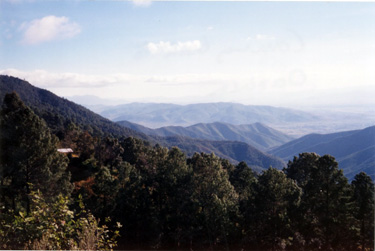Anthropologists can and must play a vital role in climate change studies, a UC Santa Cruz professor and a former UCSC doctoral student argue in an influential scholarly journal. The role of anthropology in the study of climate change has long been overlooked, they write.
Andrew Mathews, associate professor of anthropology, and Jessica O'Reilly, writing in the online journal Nature Climate Change, note that the mammoth challenges posed by climate change require the collaboration of experts from both the natural and social sciences. O'Reilly received her Ph.D. from UCSC in 2008 and now is a research associate at Princeton University and teaches at the College of Saint Benedict and Saint John's University in Minnesota.
Such cross-disciplinary approaches to research are a hallmark of UC Santa Cruz since it was founded 48 years ago.
"We suggest that anthropologists are particularly well placed to contribute to understanding and responding to these challenges," Mathews and O'Reilly write along with their eight co-authors. The article, "Contribution of anthropology to the study of climate change," stems from a workshop led by Michael Dove and Jessica Barnes of Yale University, which a year ago brought together a group of anthropologists who work on issues related to climate change.
The authors identify three ways that anthropological research can aid, enrich, and deepen contemporary understandings of climate change.
First, the discipline's tradition of in-depth fieldwork gives anthropologists insight into the cultural values and political relations that shape the creation of climate-related knowledge.
Second, "is an awareness of the historical context underpinning contemporary climate debates." Anthropological expertise gained from the study of development projects such as dam and road building can contribute to contemporary climate change mitigation projects, which may otherwise have unforeseen negative consequences for local populations.
And third is anthropology's "broad, holistic view of human and natural systems, which highlights the multiple cultural, social, political, and economic changes that take place in our societies."
Mathews, who is director of the Science and Justice Working Group at UCSC, said that anthropological contributions can complement research from other disciplines and further global dialogue on science and policy questions. Anthropologists can look at how humans approach studies of climate change and "bring insights into how science is produced in particular social, political, economic and cultural contexts."
As an example, the authors cite studies of the workings of the Intergovernmental Panel on Climate Change, an organization that is key to interpreting scientific knowledge of climate change for the international community. What factors might lead a small group of scientists to question climate change? Financial interests and conservative values may play a role, but what about culture, they ask.
Mathews and O'Reilly are joined by the lead authors from Yale, and co-authors from Columbia, Rutgers, Stanford, NASA, and universities in Brazil and the United Kingdom.





